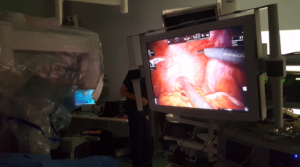A new UK-wide clinical study aimed at transforming liver cancer surveillance in people with cirrhosis has opened to recruitment. The AMULET study, led by the University of Oxford, is comparing a new MRI technique to standard ultrasound surveillance, with a view to improving early detection of ... READ MORE
News for Cancer
Possible druggable target in aggressive leukaemia revealed
Researchers at the University of Oxford have uncovered a potential new therapeutic target in a particularly aggressive and hard-to-treat form of leukaemia. A potential treatment for blast phase myeloproliferative neoplasm (BP-MPN), one of the most aggressive forms of leukaemia, has been ... READ MORE
New guidelines published for monitoring IBD patients to prevent bowel cancer
Researchers and clinicians have developed major new guidelines for the monitoring of patients with inflammatory bowel disease (IBD) to prevent them going on to develop bowel cancer. The new guidelines, developed for the British Society of Gastroenterology by academics at the Universities of ... READ MORE
New study finds common virus may improve skin cancer treatment outcomes
A new study led by University of Oxford researchers has revealed that a common and usually harmless virus may positively influence how skin cancer patients respond to current treatments. Cytomegalovirus (CMV) is a common virus that, while typically asymptomatic, is carried for life by 50 to 60 ... READ MORE
New research highlights colorectal cancer trends and survival rates
A study has shed light on the incidence and survival rates of colorectal cancer (CRC) in the UK, offering healthcare decision-makers crucial insights for planning, management and screening for the disease. The study, published in the American Journal of Gastroenterology, involved researchers from ... READ MORE
Scientists create new way to predict bowel cancer risk in people with IBD
Researchers have found a way to identify people with inflammatory bowel disease (IBD) who are at the highest risk of developing bowel cancer. IBD, which affects around 500,000 people in the UK, includes ulcerative colitis and Crohn’s disease. They irritate the lining of the bowel, which can ... READ MORE
Oxford and GSK launch £50million programme to advance novel cancer research
Leading NIHR Oxford Biomedical Research Centre researchers will play a key role in a major new collaboration between the University of Oxford and global biopharma company GSK to advance the understanding of how cancer develops, which could inform future development of vaccines to prevent ... READ MORE
Blood test developed to allow early detection of multiple cancers
Researchers at the University of Oxford have unveiled a new blood test – powered by machine learning – which shows real promise in detecting multiple types of cancer in their earliest stages, when the disease is hardest to detect. Named TriOx, this innovative liquid biopsy test analyses ... READ MORE
New biomarker and therapeutic target identified for blood cancers
Researchers in Oxford have identified a protein as a key marker for disease progression and a promising therapeutic target for patients with a type of blood cancer. In a study published in Science Translational Medicine, the team at the University of Oxford’s MRC Molecular Haematology ... READ MORE
Funding awarded for world’s first ovarian cancer prevention vaccine
Oxford researchers have been awarded up to £600,000 from Cancer Research UK (CRUK) to create the world’s first vaccine to prevent ovarian cancer. Scientists at the University of Oxford’s MRC Weatherall Institute of Molecular Medicine (MRC-WIMM), led by Professor Ahmed Ahmed, are designing ... READ MORE
Study reveals previously unknown genetic causes of colorectal cancer
A pioneering study has provided the most comprehensive analysis to date of the genetic make-up of colorectal cancer. The study, which was supported by the NIHR Oxford Biomedical Research Centre, involved the Universities of Oxford, Manchester, Birmingham, Edinburghand Leeds, The Institute of ... READ MORE
UK’s most ambitious melanoma research study created for patients, by patients
“Any melanoma patient can be part of it. You don’t have to go into a hospital, you don’t have to live near a university that’s active in research, all you need is access to the internet.” Kelly Norman, patient representative MyMelanoma is an online-based research project for melanoma ... READ MORE
Glowing dye helps surgeons eradicate prostate cancer
A glowing marker dye that sticks to prostate cancer cells could help surgeons to remove them in real-time, according to new research. Scientists at the University of Oxford and Oxford University Hospitals NHS Foundation Trust, supported by Cancer Research UK and the NIHR Oxford Biomedical ... READ MORE
Study identifies ways cancer treatment may lead to harmful side effects
A team of University of Oxford researchers have identified potential pathways by which cancer treatment can cause colitis. Checkpoint inhibitors (CPIs) are a type of cancer treatment that help the immune system fight cancer by removing some of its restraints. However, these treatments ... READ MORE
Study assesses new MRI technique to detect liver cancer
Oxford researchers have been awarded funding to conduct a study comparing a new type of MRI (Magnetic resonance imaging) to standard of care ultrasound for liver cancer surveillance in people with cirrhosis. The University of Oxford’s DeLIVER team, which is investigating early detection methods ... READ MORE
Study assesses long-term risk of invasive breast cancer after pre-invasive disease
A new study has provided evidence that women who have been diagnosed with ductal carcinoma in situ (DCIS) outside the NHS breast screening programme are around four times as likely to develop invasive breast cancer and to die from breast cancer than women in the general population. The study by ... READ MORE
Oxford BRC-funded paper named BMJ UK Research Paper of the Year
A study supported by the NIHR Oxford Biomedical Research Centre (BRC) has been named The BMJ UK Research Paper of the Year 2023. The study by researchers at Oxford Population Health into breast cancer mortality rates found that women diagnosed with early-stage breast cancer today are 66% ... READ MORE
Collaboration announced for develop use of AI to evaluate Barrett’s oesophagus
Technology to get more accurate readings of the pre-cancerous condition Barrett’s oesophagus that was devised in a study supported by the NIHR Oxford Biomedical Research Centre (BRC) is to be developed as part of a new collaboration between the University of Oxford and Satisfai Health, a ... READ MORE
Tumour monocyte content can predict immunochemotherapy outcomes, study shows
A team of Oxford researchers has discovered a link between immune cells known as monocytes in tumours and overall survival in patients with oesophageal cancer. A study by Ludwig Cancer Research, supported by the NIHR Oxford Biomedical Research Centre (BRC) found that the presence of relatively ... READ MORE
Women diagnosed with early breast cancer less likely to die from disease than 20 years ago
A study conducted by researchers at Oxford Population Health has found that women who are diagnosed with early-stage breast cancer today are 66 percent less likely to die from the disease within five years of diagnosis than they were 20 years ago. The study, which was funded by Cancer Research ... READ MORE
- 1
- 2
- 3
- 4
- Next Page »















